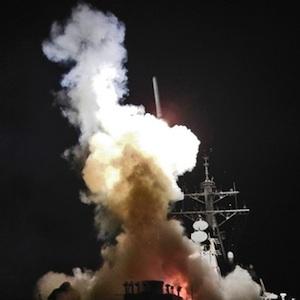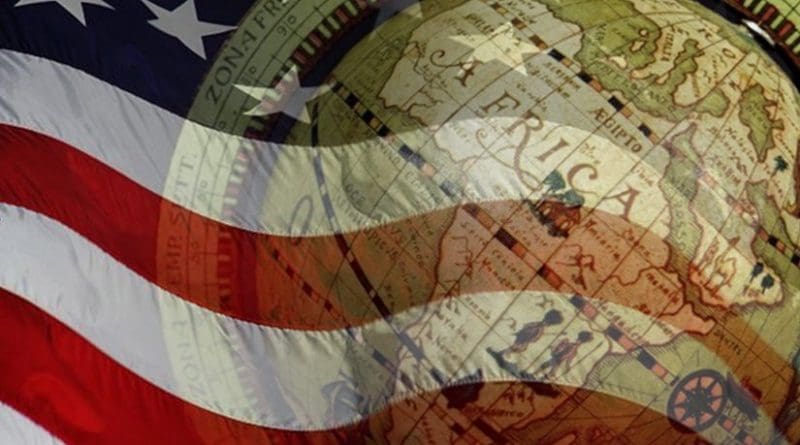AFRICOM: Meeting The Balance Between Humanitarianism And Militarism – Analysis
By Benjamin Mueller
On 19th March 2011, night had already fallen over North Africa when 112 Tomahawk missiles fired by UK and US naval forces rained down over Libya, hitting air defence installations across the country. Operation Odyssey Dawn had commenced. Under the initial authority of the governments of France, the United Kingdom and the United States, a concerted military effort began to prevent the killing of civilians by Muammar al-Gaddafi’s forces in his merciless fight-back against his own people.

One little-reported detail is the fact that Operation Odyssey Dawn was the first combat mission undertaken by the United States Africa Command (AFRICOM) since its inception in October 2007. AFRICOM had previously conducted limited military engagements as part of the Global War on Terror – Operation Enduring Freedom Trans-Sahara – but it had not undertaken a full-scale war campaign prior to the ongoing operation in Libya.
It was a combat baptism of fire for AFRICOM. Within the space of a few days, the US contributed in the region of 20 naval assets and 90 aircraft at a time when more than 150,000 servicemen are deployed in two war zones – compared to 33 French planes, 17 British jets and only a handful of naval vessels from each nation. Late in March, however, the US began to extricate itself from its leading role in combat operations. It started withdrawing its jets, ships and submarines, reduced the involvement of its troops to a supporting role, and handed over command of the mission to NATO.
However, Commander of AFRICOM, General Carter Ham, has made it clear that US Africa Command retains full readiness to reassume a direct combat role at any time should this prove necessary, for example in case of a rapid escalation of violence against civilians. Moreover, even in its more limited supporting role, the US is still conducting a range of sorties, including aerial refuelling, surveillance and reconnaissance aircraft, intelligence operations and maintaining attack fighters on standby, ready to intervene at all times. Asked how rapidly AFRICOM could reassume a leading combat role if requested by NATO, General Ham refused to go into details other than asserting that the timeframe would be ‘quick.’ [1]
One can be in no doubt, then, as to the continued overwhelming dominance of US military capabilities in the NATO framework. The United States, whether it likes it or not, remains the indispensable nation in all matters pertaining to Western security. The rapid shock and awe driven success of the early stages of Operation Odyssey Dawn, and the slowdown in pace of the rebels’ ground campaign as soon as the US retreated from direct combat engagements are striking. AFRICOM’s first combat mission, and the swiftness with which US forces engaged an enemy thousands of miles away from US soil, proves its effectiveness as a military command.
AFRICOM was the brainchild of President Bush, a by-product of his wider strategy of deepening US engagement in Africa. Toward the end of the 90s, in the wake of the terrorist atrocities directed at US military and diplomatic personnel in Kenya and Tanzania, US counter-terror efforts in Africa began in earnest. As such, it comes as no surprise that a key role of AFRICOM has been supporting anti-terror operations across the Maghreb and improving African nations’ counter-terror capabilities. But the humanitarian impulse behind it – AFRICOM’s mission statement explicitly states that it aims to ‘bring peace and security to the people of Africa’ – is not to be underestimated. The facts speak for themselves: President Bush increased US aid to Africa threefold, and American trade with the continent doubled in size under his term.
The establishment of AFRICOM elicited the usual vacuous anti-American critique, pushing the narrative of the US as a neo-colonial behemoth intent on plundering the continent of its abundant resources. Naturally, such claims are rubbish. Firstly, it is unclear how AFRICOM could serve such ends, short of deploying military force to impose direct imperial rule. Secondly, Africa is in fact the only continent where the US lacks a permanent military base. Its forces do have access to military facilities in a small number of East and West African states, but no outright territorial presence. Thirdly, the surest way to get a hold of Africa’s resources is to do it the Chinese way: sign deals with despots, hand over bags of cash and bring home the goods. The US approach of insisting on good governance and barring American companies from dealing with rogue states like Sudan hardly sounds like an arch-colonialist project.
Lastly, a note on the inexorable structural pull that inevitably goes with the sheer size and extent of the US’ military capabilities: America was very quickly dragged into a leading military role over Libya, despite the reluctance of President Obama and Secretary Gates to involve the US in yet a further armed engagement in the Arab world. To the frustration of governmental actors, the hard logic of military strategy can prevail over many a determined leader. That said, politicians can resist demands for military action: at President Obama’s insistence, the ousting of President Gbagbo in Cote d’Ivoire was implemented solely by French an UN forces, with no US involvement beyond intelligence sharing.
In any case, the fact that Western forces are simultaneously working to remove two brutal African despots makes the anti-imperialist rhetoric about the apparent ‘selectivity’ of the West’s liberal interventions seem more hollow than ever. William Kristol shall have the last words: ‘We can’t make all right with the world. But we can make some things a little better.’[2]
[1]http://www.airforcetimes.com/news/2011/04/military-libya-africom-ready-to-launch-strikes-040511w/
[2]http://www.weeklystandard.com/articles/arabs-spring-and-ours_556139.html


Can you writers stop using the word “humanitarian” with Africom? It is simply very annoying to my African ears. I have no problem whatsoever if you choose to use “recolonisation ” in conjunction with Africom. Infact use these two interchangeably. Thank you.